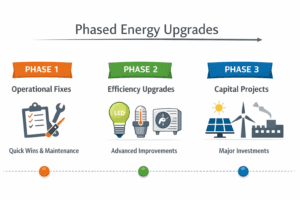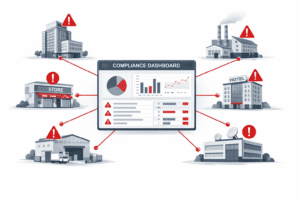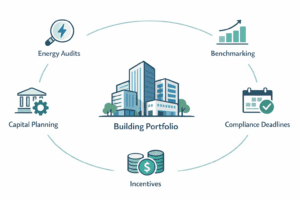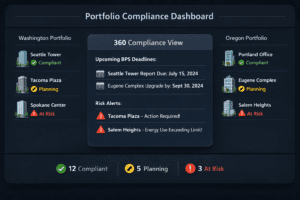Los Angeles, a sprawling metropolis known for its iconic Hollywood sign and bustling lifestyle, is also a city that takes its environmental responsibilities seriously. As the impacts of climate change become more apparent, cities worldwide are implementing strategies to reduce their carbon footprints and promote sustainable practices. In Los Angeles, one significant stride towards sustainability is the implementation of benchmarking laws that require buildings to track and report their energy and water usage. This blog explores the benchmarking requirements in Los Angeles, delving into why they are crucial for a sustainable future.
What is Benchmarking?

Benchmarking in the context of building management is the process of measuring a building’s energy and water usage and comparing these metrics to similar structures. This practice helps to identify opportunities to reduce consumption, improve efficiency, and lower operational costs. In Los Angeles, benchmarking is not just a recommendation; it’s a requirement for many buildings, governed by specific [benchmarking laws] that aim to enhance building performance metrics systematically.
The Benchmarking Laws in Los Angeles
Los Angeles has established laws that require the owners of certain types of buildings to annually measure their building’s energy and water usage and report it to the city. The ordinance covers commercial and residential buildings that are 20,000 square feet or larger. The rationale behind this law is to make energy and water use in buildings transparent, thereby encouraging efficiency improvements and sustainable building practices.
These regulations are part of a broader initiative known as the Existing Building Energy and Water Efficiency (EBEWE) Program. The program’s goals are aligned with Los Angeles’s commitment to environmental sustainability and reducing greenhouse gas emissions. It is also a critical component of the city’s plan to make buildings smarter and more efficient.
Impact of Smart Building Technology and Building Management Systems
To comply with benchmarking laws and enhance building performance, many property owners in Los Angeles are turning to smart building technology and building management systems. These technologies provide a basis for significant improvements in energy efficiency and operational performance. Smart building technology uses interconnected devices that can monitor, control, and optimize building functions, from heating and ventilation to lighting and security systems.
The integration of [AI in energy management] also plays a pivotal role in enhancing building efficiency. AI algorithms can predict energy demand and adjust building systems to optimize energy use, significantly reducing waste. This not only helps building owners comply with laws but also drives down operational costs, making buildings more sustainable and less expensive to operate.
Building Performance Metrics and Their Importance
In the context of benchmarking, building performance metrics are vital as they provide measurable data that can be analyzed to gauge a building’s efficiency. Metrics such as energy use intensity (EUI), water use per square foot, and indoor environmental quality are commonly used to assess performance. Regular tracking of these metrics allows building managers to identify trends, make informed decisions about energy use, and improve overall building performance.
Implementing energy management solutions is crucial for buildings to not only meet regulatory requirements but also to enhance their marketability. Studies have shown that buildings with green certifications and high-performance metrics have higher occupancy rates and increased asset value. Therefore, investing in energy efficiency not only complies with the law but is also a sound economic strategy.
The Role of Green Building Certification

In Los Angeles, green building certification plays a crucial role in the real estate market. Certifications like LEED (Leadership in Energy and Environmental Design) or ENERGY STAR signify that a building meets stringent performance standards. These certifications are often pursued in tandem with compliance with benchmarking laws, as they provide a structured framework for implementing sustainable building practices.
Green building certifications are not only about prestige but also about practical benefits. They can result in lower operating costs, higher tenant attraction, and potential tax benefits. For buildings in Los Angeles, achieving such certifications can also ease the benchmarking process, as the data collected for certification can be used for compliance reporting.
Conclusion
As cities like Los Angeles continue to grow, the importance of sustainable urban development becomes increasingly critical. The benchmarking requirements set forth by the city are a testament to its commitment to environmental stewardship and sustainable development. By mandating energy and water usage reporting, Los Angeles is paving the way for smarter, more efficient buildings that contribute to a healthier planet.
Building owners and managers must recognize that these requirements are not just regulatory burdens but opportunities to lead in the green building movement. By embracing smart building technology, AI in energy management, and striving for green building certification, they can significantly enhance their building’s performance, reduce environmental impact, and ultimately, contribute to the city’s sustainability goals.
In conclusion, the benchmarking laws in Los Angeles are more than just compliance; they are a crucial part of the city’s journey towards sustainability. By understanding and actively participating in these requirements, everyone from building owners to tenants can play a part in creating a more sustainable future for all.
VertPro.com offers tools and services to help property owners and managers improve building energy efficiency and meet regulatory standards. Whether you’re looking for instant pricing on energy audits, need support with benchmark compliance, or want to explore available building upgrade options, VertPro® provides user-friendly technology solutions to simplify the process. Their platform helps ensure adherence to over 60 Energy Benchmarking and Efficiency Laws across the country.
For those looking to improve their property’s energy usage and operational value, VertPro.com provides a diverse array of tools and information. The site aims to facilitate a better understanding of energy efficiency practices and legislation, helping building owners and property managers make informed decisions about their energy strategies while complying with all energy ordinances and laws.
If you’re looking to stay ahead of the curve in building management and ensure your properties meet the future benchmarking laws, we’re here to help. Fill out our contact form [here], and one of our experts will get in touch to discuss how we can assist you in optimizing your building management strategies for 2025 and beyond.















